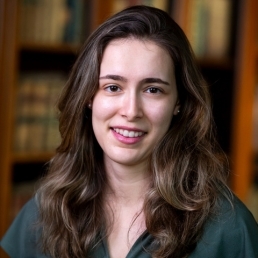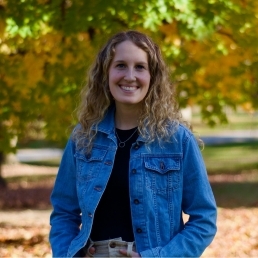Job-Seeking PhD Candidates & Postdoctoral Fellows
Job Seeking PhD Candidates and Postdoctoral Fellows
Are you an employer looking for an outstanding new hire? Meet our job seeking Postdoctoral Fellows and PhD Candidates from the Johns Hopkins Bloomberg School of Public Health's Department of Biostatistics.
Postdoctoral Fellows

Ziqiao Wang
BSPH, Department of Biostatistics
September 2022-Current
PhD Degree/Year: PhD in Biostatistics from The University of Texas MD Anderson Cancer Center UTHealth Graduate School (2021)
Doctoral dissertation title: Mixture Model Approaches To Integrative Analysis Of Multi-Omics Data And Spatially Correlated Genomic Data
Postdoc Adviser: Nilanjan Chatterjee
Area(s) of focus: Statistical genetics, multi-omics data integration, cancer genomics
Research: My research focuses on developing novel statistical methods to enhance the interpretation and application of polygenic scores (PGS), measures meant to summarize a person’s genetic predisposition for a trait and/or a disease. I developed methods to jointly model gene-environment correlations and interactions using PGS in case-control studies, with data applications in the UK Biobank; I also developed methods in estimating risk parameters of PGS in family-based studies to understand genetic direct, indirect, and gene-environment interactions between genotype-phenotype associations. Furthermore, I have been working on integrating genetic and genomic data to elucidate the etiologies of complex human diseases in large-scale, diverse consortia.
Job type preference: Assistant professor positions, research and teaching
Geographical preference: Mid-Atlantic, Baltimore-Washington Metropolitan Area, New England

Sandipan Pramanik
BSPH, Department of Biostatistics
August 2022-Current
PhD Degree/Year: PhD in Statistics from Texas A&M University (2022)
Doctoral dissertation title: Efficient Choice of Priors for Bayesian Hypothesis Tests in Psychology and for Dynamic Modeling of Zero-Inflated Directed Networks
Postdoc Adviser: Abhirup Datta and Scott Zeger
Area(s) of focus: Hierarchical Bayesian modeling; Verbal autopsy (VA) misclassification modeling; VA-based child mortality estimation; Bayesian hypothesis tests; Sequential tests; Non-local Prior; Bayes Factor Function; Bayesian Transfer Learning; Dynamic network modeling; Latent structure modeling; Statistical methods for high dimensions.
Research: During my postdoc, I am collaborating with the CHAMPS project and the Department of International Health to streamline and improve verbal autopsy (VA)-based mortality surveillance. This is based on a novel VA misclassification model that improves mortality estimation in low and middle-income countries (LMICS). Partnering with Mozambique's Instituto Nacional de Saúde and the CA CODE, I am applying the research in nearly 50 high-mortality countries, with estimates to be publicly shared. As a co-investigator for the 2024 Johns Hopkins Data Science and AI Institute Demonstration Projects Award, I am developing a one-stop web portal to improve the accessibility of research outputs.
Job type preference: Assistant professor (Tenure track)
PhD Candidates

Marina Hernandez
BSPH, DEPARTMENT OF BIOSTATISTICS
AUGUST 2021-CURRENT
Expected graduation date: Spring 2026
Advisor(s): Ciprian Crainiceanu and Brian Caffo
Area(s) of focus: Survival and longitudinal analysis with application to cardiovascular surgeries and trials, wearable data
Research: My research spans three key areas: 1) A significant portion of my work focuses on developing and implementing advanced statistical methods to model the relationship of hemodynamics time series during cardiac surgery with adverse outcomes such as acute kidney injury. 2) Another section of my research revolves around the win probability, the associate probability of the win ratio method. I evaluated the popular non-parametric win probability method against a parametric estimator I propose under exponential survival time assumptions. 3) Lastly, I explored matching on high-dimensional, objectively-measured physical activity using the National Health and Nutrition Examination Survey (NHANES) and found that the process can be highly sensitive to the exact choice of matching algorithm, caliper width, and measurement error. As a result, we propose conducting an extensive sensitivity analysis as a minimum standard for matching with high-dimensional data.
Job type preference: Industry, Government

Lily Koffman
BSPH, DEPARTMENT OF BIOSTATISTICS
AUGUST 2021-CURRENT
Advisor: Ciprian Crainiceanu
Area(s) of focus: Wearable devices data, accelerometry, functional data analysis, high density data
Research: My research focuses on methods for processing and analysis of high density data. Specifically, I have worked with raw accelerometry data from the National Health and Nutrition Examination Survey (NHANES) to examine the performance of different step counting algorithms, understand physical activity patterns in the United States, and identify individuals from their walking patterns. I also work with developing methods to model the relationship between hemodynamics data collected during heart survey and outcomes such as acute kidney injury.
Job type preference: Research, Teaching, Tech/Biotech
Geographical preference: None

Joe Sartini
BSPH, DEPARTMENT OF BIOSTATISTICS
AUGUST 2021-CURRENT
Advisors: Scott Zeger and Ciprian Crainiceanu
Areas of Focus: longitudinal data, functional data, Bayesian analysis, wearable devices, continuous glucose monitoring
Research: My research aims to develop novel statistical methods capable of drawing insights from wearable devices and observational data, with applications including diabetes and cardiovascular health. I first worked with continuous glucose monitoring data (CGM - devices that estimate blood glucose in real time) collected as part of the Atherosclerosis Risk in Communities (ARIC) study. I developed a data-driven frequency domain summary of glucose patterns and related it to comorbid outcomes. Motivated by this work, I moved to analyzing postprandial (after meal) CGM data from the Dietary Approaches to Stop Hypertension for Diabetes (DASH4D) trial. To account for all sources of uncertainty when modeling this data, I developed a robust, extensible, and scalable Bayesian approach to conducting Functional Principal Components Analysis. I have since worked to extend this approach to new data structures, with the goal of providing flexible, parsimonious models capable of characterizing variability and performing valid prediction inference for a wide range of potential datasets.
Job Type Preference: Research and Teaching
Geographical Preference: None
